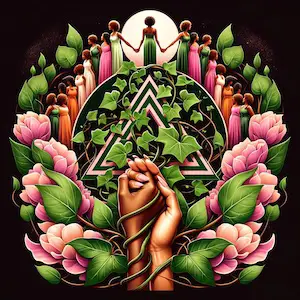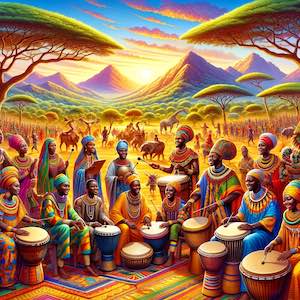In the heart of Yoruba cultural heritage lies a profound tradition that has transcended generations, weaving a tapestry of spirituality, community, and oral literature. This tradition is embodied in the Orin Ìwúre chants—a series of powerful, melodious incantations deeply rooted in the Yoruba people’s way of life. Originating from southwestern Nigeria, these chants are much more than mere poetic recitations; they are a vital expression of the Yoruba’s spiritual beliefs, cultural values, and ancestral wisdom.
The Yoruba Orin Ìwúre chants serve multiple purposes: they are invocations for blessings, prayers for protection, and hymns of gratitude. They represent the community’s voice, collectively seeking divine favor and expressing a deep connection to the spiritual realm. These chants are imbued with a belief in the power of spoken words—words that carry the energy to influence, to heal, and to transform.
This article delves into the rich world of Yoruba Ìwúre chants, exploring their historical roots, thematic richness, and the rituals and ceremonies where they are performed. It is a journey through a tradition that has not only survived the test of time but has also retained its significance and relevance in the modern world. Whether you are a student of African cultures, a lover of oral traditions, or simply a seeker of spiritual depth, the Yoruba Orin Ìwúre chants offer a window into a world where words are not just spoken but are felt, lived, and revered.

Table of Contents
The Roots of Yoruba Ìwúre Chants
Delving into the roots of Yoruba Ìwúre chants is akin to embarking on a journey through time, tracing the footsteps of a culture deeply intertwined with spirituality and the profound reverence for the spoken word. The Ìwúre chants, originating from the Yoruba people of southwestern Nigeria, are more than just traditional songs or hymns; they are the threads that weave the fabric of Yoruba society, connecting the past with the present, the physical with the spiritual.
Historically, Ìwúre chants have served as a potent instrument in the hands of the Yoruba people, used to invoke blessings, foster communal unity, and communicate with the divine. These chants are deeply rooted in the Yoruba worldview, which holds that life is a complex interplay of physical and spiritual forces, and words—especially when arranged and delivered in the form of Ìwúre—possess the power to influence these forces.
The origin of Ìwúre chants can be traced back to the Ifá tradition, a cornerstone of Yoruba spiritual practice. Ifá, a system of divination, is believed to be the repository of vast Yoruba knowledge and wisdom, encompassing philosophy, religion, and medicine. The Babalawos, or priests in the Ifá tradition, are the custodians of this sacred knowledge, including the Ìwúre chants. These spiritual leaders, revered for their wisdom and closeness to the divine, are considered the mouthpiece of the Orishas (deities) and the ancestors, using Ìwúre as a means to channel blessings and communicate divine will.
The significance of Ìwúre chants goes beyond their religious connotations; they are a cultural cornerstone. In the days of old, the Yoruba people gathered in communal spaces, using Ìwúre to mark important life events, from birth and marriage to harvest and other communal celebrations. Each chant is meticulously crafted, carrying the weight of ancestral wisdom and the collective aspirations of the community.
The power of Ìwúre chants lies not just in the words but in their delivery. The rhythmic cadence, the melodious tunes, and the communal participation in these chanting sessions create a powerful synergy, believed to open the doors to the spiritual realm, allowing blessings to flow into the physical world.
Understanding the roots of Yoruba Ìwúre chants is to appreciate the depth of a culture that sees life as a tapestry of interconnected realms. These chants are a testament to the Yoruba people’s enduring spirit, their respect for tradition, and their unwavering belief in the power of words to move, to heal, and to manifest the deepest desires of the human heart.
List of Yoruba Ìwúre Chants
Yoruba Orin Ìwúre chants are an integral part of the Yoruba spiritual and cultural heritage. Each chant is crafted with deep meaning, often invoking blessings, prosperity, protection, and guidance. Below is a list of some Ìwúre chants with their lyrics (transliterated) and meanings in English:
- Ìwúre Àjinde (Chant for Resurrection)
- Lyrics: “Ajinde aye, ajinde orun, bi a ba ku, ka jinde”
- Meaning: “Resurrection in this world, resurrection in the hereafter, if we die, let us resurrect.”
- Ìwúre Àlàáfíà (Chant for Peace)
- Lyrics: “Alaafia ni mo n wa, ni ile aye mi, ni ile orun mi, ki alaafia so mi d’owo”
- Meaning: “I seek peace in my earthly life, in my spiritual life, let peace embrace me completely.”
- Ìwúre Ìbùkún (Chant for Blessings)
- Lyrics: “Adupe lowo Olodumare, fun ibukun ti a n ri, ayo ati anu, ki won ma ba wa lo”
- Meaning: “We thank the Almighty for the blessings we see, joy, and grace, may they continue with us.”
- Ìwúre Àìsàn (Chant for Health)
- Lyrics: “Aisan o ni se gbe wa, ilera lo jumọ dami da, ki ara san wa, ki emi gigun”
- Meaning: “Illness shall not overcome us, health shall be my portion always, let the body be healed, let life be prolonged.”
- Ìwúre Ìrètí (Chant for Hope)
- Lyrics: “Nigba gbogbo ni ireti wa, ki ireti ma ba wa pin, ireti olododo, ki o ma ba wa lo”
- Meaning: “Always we have hope, let not our hope be dashed, the hope of the righteous, may it sustain us.”
- Ìwúre Òkìtì (Chant for Prosperity)
- Lyrics: “Okiti ola, okiti ire, ki o wa ba wa, ki o ma ba wa lo”
- Meaning: “Prosperity of wealth, prosperity of goodness, come and be with us, continue with us.”
- Ìwúre Ààbò (Chant for Protection)
- Lyrics: “Aabo mi, aabo re, aabo wa ni Olodumare n se, ko ni je ki a r’ibaje”
- Meaning: “My protection, your protection, our protection is what the Almighty provides, let us not see destruction.”
- Ìwúre Ìgbàgbọ́ (Chant for Faith)
- Lyrics: “Igbagbọ mi ko ni ye, ninu eleda mi, ninu awon Orisa, igbagbọ mi ko ni ye.”
- Meaning: “My faith shall not wane, in my creator, in the deities, my faith shall not falter.”
- Ìwúre Ìṣẹ́gun (Chant for Victory)
- Lyrics: “Isegun ni fun wa, lori ogun aye, lori ogun orun, a ni isegun.”
- Meaning: “Victory is ours, over the battles of life, over the battles of the spiritual, we have victory.”
- Ìwúre Ìmọlẹ̀ (Chant for Enlightenment)
- Lyrics: “Imole so okunkun di nu, imole fi han wa ola, ki imole wa ko ni ku.”
- Meaning: “Light dispels the darkness, light reveals the future, may our light never dim.”
- Ìwúre Ọlá (Chant for Honor)
- Lyrics: “Ola wa o ni di iranu, niwaju Olorun ati eniyan, ayo wa ni ola wa.”
- Meaning: “Our honor shall not be in vain, in the presence of God and men, our joy is in our honor.”
- Ìwúre Àyànmọ́ (Chant for Destiny)
- Lyrics: “Ayanmo wa o ni daru, ninu irin ajo aye, ayanmo wa, ko ni daru.”
- Meaning: “Our destiny shall not be marred, in the journey of life, our destiny, shall not be marred.”
- Ìwúre Ìdàgbàsókè (Chant for Progress)
- Lyrics: “Idagbasoke a tẹle wa, ni ilu wa, ni ile wa, ki ilosiwaju wa ma ba lai.”
- Meaning: “Progress shall follow us, in our land, in our homes, may our advancement never cease.”
- Ìwúre Àjọṣepọ (Chant for Unity)
- Lyrics: “Ajosepo wa ko ni wọgile, laarin wa, laarin agbaye, ki ajosepo wa jẹ kikun.”
- Meaning: “Our unity shall not be shattered, among us, in the world, may our union be complete.”
- Ìwúre Ìrẹpọ (Chant for Harmony)
- Lyrics: “Irepo so wa di alaafia, ni gbogbo ibi, ki irepo wa mu ilera wa.”
- Meaning: “Harmony shall bring us peace, in every place, may our harmony bring us wellness.”
- Ìwúre Àtúntò (Chant for Restoration)
- Lyrics: “Atunto a wa fun wa, ninu aye wa, ninu ohun gbogbo, ki atunto mu itunnu wa.”
- Meaning: “Restoration shall come to us, in our lives, in everything, may restoration bring us joy.”
- Ìwúre Ààbọ Àìmọye (Chant for Countless Protection)
- Lyrics: “Aabo aimoye a wa gbe wa, lati oju orun, lati aiye, ki aabo wa ma ba lai.”
- Meaning: “Countless protection shall shield us, from the heavens, from the earth, may our protection never end.”
- Ìwúre Ìfọkànsìn (Chant for Focus)
- Lyrics: “Ifo kansin wa ko ni ye, ni opo igba, ni opo ojo, ki ifokansin wa ko ni di otito.”
- Meaning: “Our focus shall not waver, in numerous times, on numerous days, may our focus remain true.”
- Ìwúre Ìgbàlà (Chant for Salvation)
- Lyrics: “Igbala wa o ni sako, lati aiye ati orun, ki igbala wa ma ba lai.”
- Meaning: “Our salvation shall not falter, from the earth and the heavens, may our salvation never cease.”
- Ìwúre Àṣeyọrí (Chant for Success)
- Lyrics: “Aseyori a ma wa ni tẹle wa, ni oju ise wa, ni oju ebi wa, ki aseyori wa ko ni di otito.”
- Meaning: “Success shall always follow us, in our work, in our families, may our success become reality.”
- Ìwúre Ìtura (Chant for Comfort)
- Lyrics: “Itura a wa ba wa, ninu okan wa, ninu ile wa, ki itura wa ma ba lai.”
- Meaning: “Comfort shall be with us, in our hearts, in our homes, may our comfort never end.”
- Ìwúre Ìgbọ́ràn (Chant for Obedience)
- Lyrics: “Igboran si ilana, si asa, ki o wa pelu wa, ki igboran si ohun rere ma ba wa lo.”
- Meaning: “Obedience to principles, to culture, shall be with us, may obedience to good things continue with us.”
These Ìwúre chants are deeply embedded in the Yoruba culture, encapsulating the people’s hopes, prayers, and deepest desires. Each chant is not just a set of words but is laden with spiritual significance, believed to have the power to influence the course of events and bring about positive changes in the lives of individuals and the community.
The Rituals and Ceremonies
The rituals and ceremonies involving Yoruba Ìwúre chants are a profound manifestation of the Yoruba people’s spirituality, culture, and ancestral heritage. These rituals are not merely traditional practices but are deeply symbolic, serving as a bridge between the physical and spiritual realms. The Ìwúre chanting ceremonies are not just about the recitation of words; they are holistic spiritual events that engage the participants’ entire being—body, mind, and soul.
Preparation for Ìwúre Chanting The preparation for Ìwúre chanting is as crucial as the chanting itself. It often begins with physical and spiritual cleansing to create a pure and receptive environment. This may involve the use of sacred herbs, water, or other elements believed to have purifying properties. Participants might also abstain from certain foods or activities to cleanse their bodies and focus their minds.
Before the chanting begins, an altar or sacred space is often set up. This space is usually adorned with objects of spiritual significance such as white cloths, symbolic artifacts, divination tools, and offerings to the deities and ancestors. The setup of this space is highly intentional, with each element placed to harmonize spiritual energies and invite divine presence.
The Chanting Ceremony The ceremony itself is a structured yet deeply spiritual event. It begins with invocations and prayers, calling upon the ancestors, deities, and spiritual guides to attend and bless the gathering. The lead chanter, often a Babalawo or an individual well-versed in Yoruba spirituality, initiates the Ìwúre chants, setting the tone and pace of the ceremony.
As the chants progress, other participants join in, creating a collective harmony. The chants are usually rhythmic, allowing participants to enter a meditative state, making the experience more profound. In some ceremonies, traditional musical instruments like the Bata drum, Shekere, or Agogo bells accompany the chants, adding to the ceremony’s rhythmic and trance-inducing nature.
The content of the Ìwúre chants varies, each addressing specific themes such as blessing, protection, healing, prosperity, or communal well-being. The words are powerful, carefully chosen, and recited with intention and emotion, believed to carry the power to invoke, bless, and transform.
Closing the Ceremony The conclusion of the Ìwúre chanting ceremony is as significant as its commencement. It often involves expressions of gratitude to the deities, ancestors, and spiritual guides for their presence and blessings. The closing rituals may include communal feasting, sharing of blessings, or personal reflection, allowing the participants to internalize the spiritual experience.
The Role of Community The community plays an integral role in these ceremonies. The collective energy, participation, and harmony are believed to amplify the power of the chants, creating a network of spiritual energy that benefits the individual and the community. The Ìwúre chanting ceremonies are not just spiritual events; they are communal gatherings that reinforce social bonds, cultural identity, and collective consciousness.
In essence, the rituals and ceremonies involving Yoruba Ìwúre chants are a rich tapestry of spiritual practice, cultural expression, and communal harmony. They encapsulate the Yoruba people’s profound connection to their ancestry, their deities, and the universe, reflecting a deep understanding of the interplay between the physical and the spiritual realms.
Themes of Ìwúre Chants
Yoruba Ìwúre chants are imbued with rich and diverse themes, each reflecting the multifaceted aspects of life and the deeply spiritual worldview of the Yoruba people. These chants are not merely poetic expressions; they are profound communications with the divine, seeking intervention, blessings, and guidance in various life areas. Below are some of the central themes found in Ìwúre chants.
Prosperity and Well-being A significant portion of Ìwúre chants focuses on prosperity and well-being. These chants are recited with the belief that words have the power to manifest wealth, abundance, and a harmonious life. The Yoruba people understand prosperity not just in terms of material wealth but as a holistic concept that includes peace of mind, harmony in relationships, and balance in one’s life. Ìwúre chants for prosperity and well-being are often comprehensive, covering aspects of health, family, success, and overall happiness.
Protection and Warding off Evil Protection is another prevalent theme in Ìwúre chants. In the Yoruba belief system, life is a complex interplay of forces, and humans are always in need of divine protection against negative energies and malevolent forces. Ìwúre chants for protection are powerful tools, invoking the deities’ and ancestors’ power to shield individuals and the community from harm, to ward off evil intentions, and to create a protective barrier against spiritual attacks.
Spiritual Growth and Enlightenment Spiritual growth and enlightenment are deeply cherished themes in Yoruba spirituality, and this is reflected in the Ìwúre chants. These chants seek to deepen one’s connection with the divine, to gain wisdom, and to understand life’s mysteries. They are recitations that yearn for inner peace, spiritual awakening, and the illumination of the mind and soul.
Communal Harmony and Social Cohesion Yoruba society places great importance on community and social harmony. Many Ìwúre chants are dedicated to fostering unity, resolving conflicts, and strengthening the bonds within families and the wider community. These chants are a call for mutual respect, love, understanding, and cooperation among community members, believing that a harmonious community is the bedrock of a prosperous and peaceful life.
Blessings of Nature and Fertility Respect and reverence for nature are deeply ingrained in Yoruba culture, and this is evident in Ìwúre chants that focus on fertility and the blessings of nature. These chants express gratitude for the Earth’s bounty, seek fertility for the land and its people, and ask for favorable weather and successful harvests. They reflect an understanding of the interconnectedness of all life and the dependence of humans on nature’s gifts.
In conclusion, the themes of Ìwúre chants are a reflection of the Yoruba people’s worldview, their understanding of life’s complexities, and their profound connection to the spiritual realm. These chants are not just words; they are the soul’s expressions, seeking to harmonize the physical and spiritual aspects of existence, and to invoke the blessings that make life whole and meaningful.
FAQ
Who can perform Ìwúre chants, and how are they learned?
Ìwúre chants are typically performed by individuals well-versed in Yoruba spirituality, such as Babalawos (priests) or elders in the community. The knowledge of Ìwúre chants is traditionally passed down orally from generation to generation, with each chant carefully taught and memorized to preserve its integrity and efficacy.
See Related Posts

Gregorian Christmas Chants

Love Spell Chants

Best Softball Chants for U12

AKA Sorority Chants

Argentina Football Chants

Short Chants and Cheers

Alabama Football Chants

Everything to Know About African Chants

